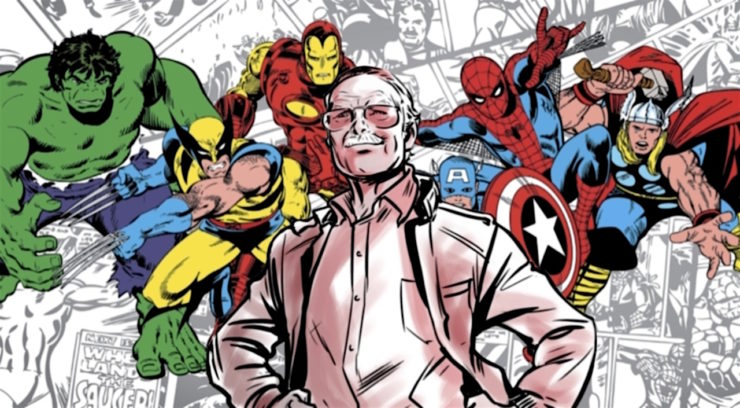Marvel Comics writer, editor, and publisher (and frequent cameo-maker in the Marvel Cinematic Universe) Stan Lee has passed away. The co-creator of Iron Man, Spider-Man, Black Panther, The X-Men and many more iconic comic book series was 95.
He was born Stanley Lieber in New York City in 1922. His father, a dress-cutter, moved the family to several different small apartments as the family tried to stay afloat during the Great Depression, finally ending up in a one bedroom apartment in the Bronx where Stan and his younger brother Larry shared the bedroom, while his parents took the fold-out couch in the living room.
In 1939 his uncle helped Stan get a job as an assistant at Timely Comics (he was officially hired by Captain America co-creator Joe Simon) and he quickly took on a diverse list of tasks, including grabbing lunch for artists, proofreading text, and erasing the penciling from pages once they were inked. In 1941, Lee made his comics writing debut with the filler for a Captain America comic, using the name “Stan Lee” in order to save his birth name for the novel he hoped to write. The bosses liked his work enough to let him contribute more scripts, and when Jack Kirby and Joe Simon both left the company at the end of the year, Lee was promoted to an editorship at just 19 years old. By this point, comics as a medium were past their Golden Age, and Lee spent the 1950s working on a wide variety of comics genres, including Westerns, romances, and funny animal books. But the stories the market demanded were uninspiring to Lee, and by the end of the decade was on the verge of quitting the field entirely.
There are several stories about the origin of the “Silver Age” of comics—the age that Marvel ushered in—but the sweetest one is that Lee’s wife Joan told him to stop writing comics for everyone, and try writing one for himself. Since he wanted to quit anyway, what was the worst that could happen?
Lee thought it over, and began working on a new kind of superhero.
Rather than conforming to the typical idea of a perfect, untouchable superhero, Lee created characters with real problems, family relationships, neuroses, fears, and flaws. They spoke natural (if slightly over-the-top) dialogue. They had trouble paying their bills. In some cases it took them time to learn how to use their powers, and they wrestled with a real sense of temptation to use those powers for evil, or at least for personal gain. In focusing on the kind of stories he wanted to read, rather than the stories that had always been told, he was instrumental in making superhero comics relevant and daring in the 1960’s. In November 1961, Fantastic Four #1 came out to immediate popularity, and Marvel took off from there, turning out a seemingly inexhaustible list of superheroes including Spider-Man, Sub-Mariner, The Silver Surfer, Iron Man, Daredevil, the X-Men, and The Incredible Hulk. Stan Lee’s heroes aren’t paragons of perfection, but instead fallible human beings that readers (particularly the generation of kids just hitting their teens in the mid-60s) could empathize with. Without a doubt, the world of gripping heroics was made more relatable through the creations of Stan Lee, and it was this relatibility that re-vitalized the superhero genre in the 1960s.
He collaborated with some of the greatest artists to work in comics, including Jack Kirby and Steve Ditko, who co-created the Fantastic Four and Spider-Man, respectively. Lee’s snappy, witty, writing served as a perfect complement both to Kirby’s dynamic, bursting-out-of-the-panel style, and Ditko’s precision and elegance.
While he confessed to embarrassment about his career in comics early on, Stan Lee became one of the great champions of the industry, and led a battle against the Comics Code Authority that forced the organization to reform their policies.
Lee served as a figurehead and public face for Marvel and founded Stan Lee Media and POW Entertainment in the 1990s and 2000s. He was inducted into The Will Eisner Award Hall of Fame in 1994 and the Jack Kirby Hall of Fame in 1995. Though semi-retired, Lee remained active in comics media and only retired from public appearances mere months before his passing.
We are saddened by his loss, but lifted by what he brought into this world. To borrow from his own famous sign-off; onward and upward. Excelsior.










